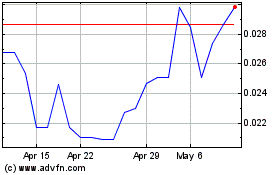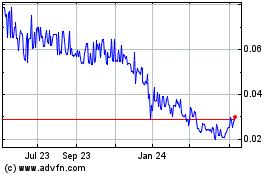American Lithium Minerals Releases Initial Drill Results for the Borate Hills Project
February 08 2011 - 8:30AM
Marketwired
American Lithium Minerals, Inc. (OTCBB: AMLM)
(www.AmericanLithium.com) (the "Company") is pleased to announce
the drill results from 6 RC drill holes at the Borate Hills Project
in Nevada. The RC Drill Program began in late November and over
10,000 feet has been drilled across 13 RC drill holes completed to
date. There are currently 2 RC drill rigs and 1 core rig active on
the Borate Hills Project.
From the first 6 RC drill holes at the Borate Hills Project;
significant intercepts of Lithium and Boron mineralization have
been identified along a strike length of over 1 kilometer from the
SBH-4 RC drill intercept in the south to the SBH-7 RC drill
intercept in the north. The drill holes are oriented perpendicular
to known structure and the intercepts are representative of true
widths of the mineralized units.
The drill hole farthest to the south to date is SBH-4:
- 300 to 420 ft for a 120 ft intercept of 1890 ppm Li and 12,154
ppm B
- Including 40 ft of 2533 ppm Li and 3695 ppm B
- Including 65 ft of 1620 ppm Li and 20,077 ppm B
- 625 to 695 ft for a 70 ft intercept of 1246 ppm Li and 7654 ppm
B
SBH-5
- 20 to 110 ft for a 90 ft intercept of 1493 ppm Li and 12,503
ppm B
- 250 to 400 ft for a 150 ft intercept of 1734 ppm Li and 13,640
ppm B
- Including 55 ft of 2421 ppm Li and 16,201 ppm B
SBH-6
- 40 to 75 ft for a 35 ft intercept of 1038 ppm Li and 6470 ppm
B
- 210 to 480 ft for a 270 ft intercept of 1369 ppm Li and 10,800
ppm B
- Including 60 ft of 2286 Li and 13,490 ppm B
SBH-1
- 230-350 ft for 120 ft intercept of 1778 ppm Li and 14,073 ppm
B
- 460-620 for 160 ft intercept of 1206 ppm Li and 8,771 ppm
B
The mineralized drill hole farthest to the north is SBH-7
- 180 to 330 ft for an intercept of 150 ft of 1828 ppm Li and
9464 ppm B
- Including 45 ft of 2566 ppm Li and 1402 ppm B
- Including 15 ft of 2033 ppm Li and 18,667 ppm B
- 455 to 600 ft for an intercept of 145 ft of 1619 ppm Li and
8902 ppm B
- Including 20 ft of 2435 ppm Li and 11,612 ppm B
SBH-2 was a step-out hole located 700 metres north of SBH-7 but
only encountered weak mineralization. The current RC drill program
is stepping out to the south of SBH-4.
A rigorous quality control program is in place using duplicate
samples and 5 custom standards with a range of values for Li, B, Sr
and As that were made for the Borate Hills Project. ALS Minerals in
Reno, Nevada is using aqua regia 2 acid digestion and ICP mass
spectrometry and ICP which was determined to be the optimal assay
method from the summer sampling program. ALS also inserts numerous
quality control samples. The drill program is being supervised by
Crown Gold Corporation, Reno, Nevada.
The Borate Hills Project is a large co-product lithium and boron
deposit located 20 miles west of the only producing lithium mine in
North America. American Lithium and JOGMEC are currently completing
an economic pre-feasibility study for the Borate Hills Project.
The Nevada, United States location is strategic for the
concentration of U.S. manufacturing requiring lithium; including
automotive batteries, power storage and consumer electronics; as
well as a known mining state with excellent road, rail and power
infrastructure. American Lithium is also active in grassroots
exploration for lithium deposits in the Great Basin of the United
States with ten other highly prospective projects in Nevada and
Utah.
About the Borate Hills Project
The Borate Hills Project consists of the North and South Borate
Hills Projects. The boron and lithium mineralization is contained
in a strata-bound formation that is a combination of a claystone
unit and a volcanic tuff. In the early 1980s, US Borax drilled the
North Borate Hills Deposit and stated the project was the second
largest boron deposit in the United States after their current
producing borate mine, Kramer Borate in California. Subsequently,
US Borax discovered the South Borate Hills Deposit in 1986.
About Japan Oil, Gas and Metals National
Corporation (JOGMEC)
Japan Oil, Gas and Metals National Corporation (JOGMEC) was
established on February 29, 2004 pursuant to the Law Concerning the
Japan Oil, Gas and Metals National Corporation, which was
promulgated on July 26, 2002. JOGMEC integrates the functions of
the former Japan National Oil Corporation, which was in charge of
securing a stable supply of oil and natural gas, and the former
Metal Mining Agency of Japan, which was in charge of ensuring a
stable supply of nonferrous metal and mineral resources and
implementing mine pollution control measures.
About American Lithium Minerals
American Lithium Minerals is a U.S.-based mineral exploration
company focused on the development of lithium and boron resources
in Nevada. The company's key objective is to develop world-class
lithium projects that will capitalize on surging demand for
lithium-ion batteries, particularly for hybrid and electric
vehicles. Lithium is a high-priority and strategic mineral for the
U.S. The country's green energy legislation and long-term energy
policies depend on developing a vibrant, domestic lithium-ion
battery manufacturing sector.
About Lithium
As a result of lithium-ion battery demand for hybrid-electric
and electric cars, the increase in demand for lithium carbonate is
expected to increase four-fold over the next decade. High demand
and low supply has already resulted in an increase in lithium
carbonate (Li2CO3) prices. There is currently only one producer of
lithium carbonate in the United States, Chemetall's Clayton Valley
Operation. The Great Basin of the United States represents
excellent potential for the discovery of new lithium brine deposits
and American Lithium Minerals is well positioned for detection with
its projects. Lithium is used for batteries, specialty glass,
lubricants, pharmaceuticals and lithium alloys. Lithium ion
(Li-ion) batteries have become the rechargeable battery of choice
in cell phones, computers, hybrid-electric cars and electric cars.
GM, Ford, Toyota, Dodge, Chrysler, Mitsubishi, Nissan, Tesla,
Saturn and Mercedes-Benz have all announced plans to build Li-ion
battery-powered cars. Demand for lithium-powered vehicles is
expected to increase fivefold by 2012. The domestic automotive
industry must secure a lithium source to supply the next generation
of hybrid-electric and electric vehicles. Over 60% of cell phones
and 90% of laptops use lithium batteries. The worldwide market for
lithium batteries is estimated at over $4 billion per year.
Forward-Looking Statements
Actual results could differ from those projected in any
forward-looking statements due to numerous factors. Such factors
include, among others, the inherent uncertainties associated with
mineral exploration and difficulties associated with obtaining
financing on acceptable terms. We are not in control of lithium
prices and these could vary to make development uneconomic. These
forward-looking statements are made as of the date of this news
release, and we assume no obligation to update the forward-looking
statements, or to update the reasons why actual results could
differ from those projected in the forward-looking statements.
Although we believe that the beliefs, plans, expectations and
intentions contained in this press release are reasonable, there
can be no assurance that such beliefs, plans, expectations or
intentions will prove to be accurate. Investors should consult all
of the information set forth herein and should also refer to the
risk factors disclosure outlined in our most recent annual report
for our last fiscal year, our quarterly reports, and other periodic
reports filed from time-to-time with the Securities and Exchange
Commission.
For Additional Information, Contact: Stephen Cook Vice
President/Investor Relations Tel: 877-717-2656 E-mail:
info@americanlithium.com
American Lithium Minerals (PK) (USOTC:AMLM)
Historical Stock Chart
From Dec 2024 to Jan 2025

American Lithium Minerals (PK) (USOTC:AMLM)
Historical Stock Chart
From Jan 2024 to Jan 2025
